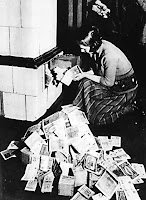
A lot of people still seem to believe in money – and therefore seem to think that something dreadful has 'happened to it' recently – as though it resembles the weather, or something outside our control - rather than the behaviour of human herds.
A million pound note sold for a mere £78,000. (This evokes the Mark Twain story)
Our Maybe editor Kent did say “get into gold” in his “Will You Survive the Coming Financial Crash?” and he appears to have been right in predicting that, although (ironically, given that he got the economics right) he didn’t survive it for medical reasons. (sigh)
A million pound note sold for a mere £78,000. (This evokes the Mark Twain story)
Our Maybe editor Kent did say “get into gold” in his “Will You Survive the Coming Financial Crash?” and he appears to have been right in predicting that, although (ironically, given that he got the economics right) he didn’t survive it for medical reasons. (sigh)

And hyperinflation wipes everything away (if you think a million pound note improbable).
I still don’t really understand why gold works for people when paper doesn’t, however.

With a very little brain like mine, I find it easier to use a metaphor to understand what people think of as ‘money’.
The casino movie
where rich people gamble, and then run out of ‘cash’ so they put their shirt, their family inheritance, whatever – on the turn of the next card – and end up in debt.
As often as not, to get that IOU back they have to do something for the casino owners that goes against their normal behaviour - or just accept the 'pearl-handled revolver on the terrace'.
Now that’s just debt from bad judgement (selling the family jewels).
You get more of a plot if the casino needs some leverage over someone, so raises their hopes, encourages their gambles, and over-extends their credit (knowing full well that the odds favour them – eventually – winning it all, and ending up with power over the unfortunate gambler). And in such a plot, if luck started to favour the gambler, it seems safe to think that the casino would cheat to make him lose.
Lending money to sub-prime users could just be bad judgment, but it seems far more likely (to me) that it had a hidden agenda. Would you lend your own money to someone unlikely to pay it back? No, neither would I. Of course, if you lend money (at interest) to lots of people, perhaps you thought only a small minority would fall down…covered by the profits from the others. Um. It does seem a good way to scare and enslave people, however.
The only way (back in the movie) for the trapped person to escape the obligation usually involves borrowing from someone else (only temporarily solving the urgency of the problem of meeting a deadline), stealing, or selling something valuable (if you have anything at all left).
As money doesn’t really exist, this is not the same as just a bad crop, or shortage of apples for the year.
The government gives the banks the right to print money, and then the banks lend that ‘magic money’ back to the government at a rate of interest. There’s nothing there but IOUs! Check out my previous entry, or go straight to the excellent video of Money As Debt for a lucid explanation. It'll only take 30-40 minutes of your time, and worth every second!
So long as people 'believe in money', or trust others to eventually ‘pay back’ with something tangible, this imaginary system works. Once you have lost confidence it is hard to get it back.
Writing another, bigger, IOU doesn’t really cut it…I am the casino boss now, and I want my pound of flesh – no more promises, pleadings and bits of paper.

Any house of cards has always seemed a fairly unstable model (although here’s Bryan Berg the world champion card stacker) – except for the magicians’ special-effect version which instantly erects itself for a big finish appearance.
 And magicians (ever topical) can now produce a card castle made from credit cards! heh heh
And magicians (ever topical) can now produce a card castle made from credit cards! heh heh
So, returning to our unfortunate gambler – now enslaved to whoever owns that IOU (and they do get bought and sold and passed around) – does he know he’s been manipulated? Can he just shrug? Perhaps he can get the obligation written off or forgiven? Not usually out of the kindness of anyone’s heart – more likely for some great favour done (think Pulp Fiction).
After a period of apparent democratisation, and sharing of wealth with the workers, and self-sufficiency (“own your own home!”) – the real wealth (stuff) seems destined to fall back into the hands of the very rich individuals, and the institutions (banks, governments, etc). They don’t really care if the ‘value’ of the property has gone down, as those figures were only as imaginary as the bait of lottery wins anyway. But they do end up with you wage slaves paying them rent again. Lovely!
At this point, my own bets (that I wouldn’t receive a pension, so why invest? That savings would get wiped out, so why save? That borrowing would end up enslaving me, so why borrow against an uncertain future?) seem quite good.
I am rarely more than a couple of hundred pounds away from ZERO – sometimes up, sometimes down, but never very far each way. I have been considered poor by most people’s standards, of course (no credit). Right now I am little better or worse off than during the rest of my life (Freedom, as Janis so rightly pointed out, is just another word for nothing left to lose).

No comments:
Post a Comment